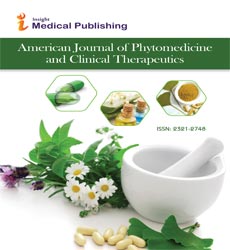ISSN : 2321-2748
American Journal of Phytomedicine and Clinical Therapeutics
Optimizing Weed Biocontrol with Plant Metabolomics
Andrea Fowler*
Department of Agriculture and Environment, Massey University, Wellington, New Zealand
- *Corresponding Author:
- Andrea Fowler
Department of Agriculture and Environment, Massey University, Wellington,
New Zealand,
E-mail: andrea.fowler@gmail.com
Received date: July 12, 2024, Manuscript No. IPAPCT-24-19572; Editor assigned date: July 15, 2024, Preach No IPAPCT-24-19572 (PQ); Reviewed date: July 29, 2024, QC No. IPAPCT-24-19572; Revised date: August 05, 2024, Manuscript No IPAPCT-24-19572 (R); Published date: August 12, 2024, DOI: 10.36648/2321-2748.12.02.284
Citation: Fowler A (2024) Optimizing Weed Biocontrol with Plant Metabolomics. Am J Phytomed Clin Ther Vol. 12 No.02: 284.
Description
Plant metabolomics is the study of plant biochemistry at the molecular level, elucidating both known and unknown metabolites (intermediate or end products of metabolism) in biological samples. This technique combines analytical chemistry, bioinformatics and multivariate statistics, allowing characterization of the biochemical profile of a plant and identification of biochemical phenotypes. Metabolomics analyses of plants is now relatively common place, but a literature review showed little evidence that this technology is being applied to support weed biocontrol programs. Understanding invasive plant biochemical phenotypes and the biotic and abiotic influences determining that phenotype, could provide valuable information to assist with agent-selection decisions in weed biocontrol programs, with potential to improve agent establishment rates and overall impacts on target weeds.
Metabolomics in weed biocontrol
Plant metabolomics could also further refine the determination of potential non-target taxa in host specificity testing, currently based on the centrifugal phylogenetic relatedness method. Metabolomics is a constantly evolving and powerful tool which can elucidate the complex biochemical interactions between plants and insects or pathogens. We explore how abiotic and biotic stressors may alter a plants biochemical phenotype, which may consequently affect insect herbivore performance. We provide a brief explanation of the key concepts in metabolomics technologies then examine a range of potential applications which may benefit weed biocontrol programs. Plant biochemical responses to abiotic stressors, herbivores and pathogens, collectively take the form of constitutive or inducible Plant Secondary Compounds (PSC) which are now known to mediate interactions between competitors and mutualists, the effects of which can cascade through entire ecosystems.
Metabolomics and biocontrol
Metabolomics, the most recent of the “omics” technologies, can reveal the complexity of biochemical responses associated with phenotypic variation and the influence of environment or experimental treatments on biological systems an exciting potential application of this technology is its ability to reveal plant biochemical responses to as well as biotic stressors such as insect herbivores and plant pathogens which may be of interest to biocontrol practitioners. Classical biological control of weeds is the reuniting of specialist co-adapted herbivores, usually insects or pathogens, with their original host plant, where that plant has established and become invasive in a new environment The ecological basis to this form of biological control is that the herbivore reduces plant vigor to a new equilibrium level, below that which causes either economic or environmental damage this management system is a viable and self-sustaining solution to controlling invasive plants in both managed and natural ecosystems. If implemented according to best practice, it is low risk can preserve the integrity of plant communities and arrest the loss of biodiversity at the species, community, or ecosystem level. Biocontrol programs inevitably require many years to complete environmental risk assessment, agent selection, host range specificity testing and regulatory authorization for importation and release of organisms. Historically and currently, the main challenges to biocontrol agent selection is the ability to predict agent establishment, effectiveness i.e., impact on the target plant and safety. The probability of non-target impacts. There are well established protocols currently utilized to assist with these assessments, however, rarely is consideration given to host plant biochemistry.
Utilizing metabolomics in weed biocontrol
The biochemical phenotype determines the fall on nutritional value and levels of defensive Plant Secondary Compounds (PSC) of the plant, many of which can be altered by abiotic and biotic factors such compounds can have an extreme effect on insect performance and population dynamics both of which are key elements determining the establishment and effectiveness of a weed biocontrol agent. Altered host plant biochemical phenotype and how it impinges on the establishment and effectiveness of introduced biocontrol agents is poorly look into we propose that metabolomics may be a valuable tool for investigating such changes and be of value when considering agent selection. We look into how and why invasive plants are likely to display alterations to their biochemical phenotype in a new range, the complex effects of co-occurring biotic and abiotic factors on plant biochemistry,briefly describe what metabolomics is and consider how, with collaboration of plant biochemists, knowledge generated by this technology may apply to weed biocontrol in an effort to potentially improve agent establishment, effectiveness and safety.

Open Access Journals
- Aquaculture & Veterinary Science
- Chemistry & Chemical Sciences
- Clinical Sciences
- Engineering
- General Science
- Genetics & Molecular Biology
- Health Care & Nursing
- Immunology & Microbiology
- Materials Science
- Mathematics & Physics
- Medical Sciences
- Neurology & Psychiatry
- Oncology & Cancer Science
- Pharmaceutical Sciences
